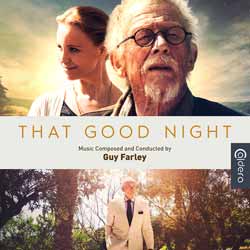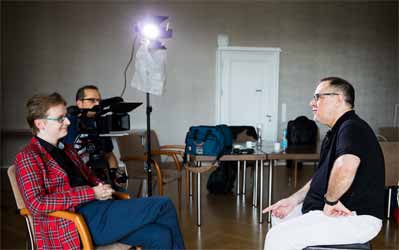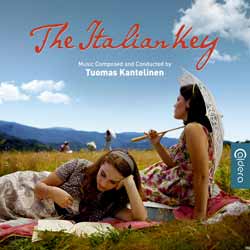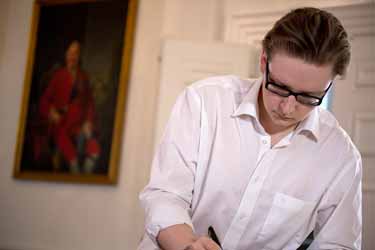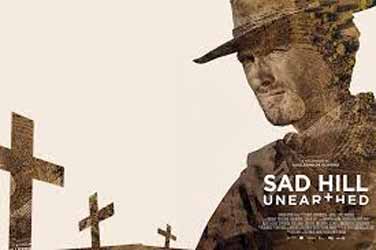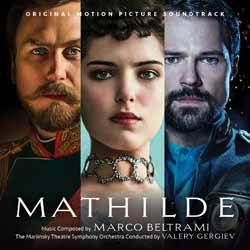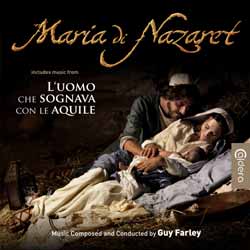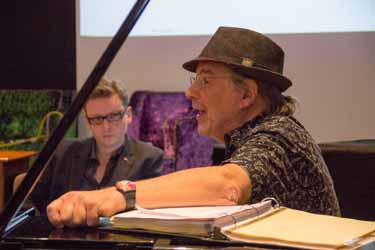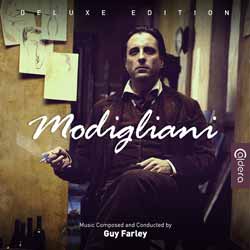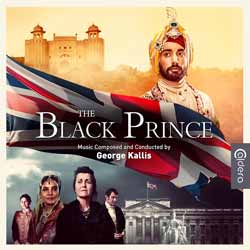|
Click here to return to the main site. Stephan Eicke (Director) - Caldera Records ©Matthias Scheuer, audioberlin.com Stephan Eicke was born in Germany in 1990. Growing up he took lessons in guitar, trombone, euphonium and Piano. At the age of 17 he became a writer for the European film music-magazine Cinema Musica. Over the years he's been a reviewer and editor for several magazines, as well as an orchestrator and composer in his own right. In 2013 he founded the CD-label Caldera Records, which is dedicated to releasing international soundtracks in editions that offer the highest qualities. Darren Rea spoke with him as Caldera Records released That Good Night on CD... Darren Rea: Caldera's current release is Guy Farley's score for That Good Night, can you tell us how you came to choose this as your latest project? Stephan Eicke: Guy [Farley] and I go back a long way. We met each other seven years ago and we've become very close friends.
Guy invited me to the recording sessions for That Good Night. I don't remember when they took place, but I remember I couldn't attend because I was somewhere else in Europe at that time. But Guy then invited me to the unofficial premier of the film - there was an exclusive screening of the film for possible investors and distributors. I watched the film with Guy sitting on one side of me and with the director on the other side. I remember that the night before I hadn't been able to sleep. Then I sat in the screening room, next to the director, and I panicked: "I can't allow myself to fall asleep now. It's bad for business!" I watched the film and managed to not fall asleep. To be perfectly honest I wasn't fond of the film but the music I thought was actually rather nice. It has a lofty sort of score. It has this kind of mediterranean feel. Guy then asked me whether I'd be interesting in releasing it, and I said: "Why don't you send the music as an MP3 first so that I can listen to it and then we'll decide." He sent me the music a couple of weeks later and I listened to it and thought: "There's promising material here." The problem is that the individual cues were very short, so it wasn't a particularly good listening experience. I then suggested to Guy that we could connect a few cues together to make them longer and structure the album properly. Guy agreed to do that. I went to his studio and we worked on the sequencing. Guy and I put cues together and finally we had a score that I was happy to release. Is that how you normally work? Do you strive to ensure that the releases can be listened to as a standalone project, even if the music in the film is just a collection of cues? I know when I receive a Caldera release for review that it's going to be an album that has been carefully put together and will be one that I'll get hours of listening pleasure out of.
That's very kind, thank you. That's very much the way we work. First of all I approach the composer, because I either know them very well or I like them very much. I then say to the composer: "I see you've recently worked on a film. Why don't you send me the music and we can decide to release it or not?" Or I've already heard bits and pieces of a certain score and have decided that could be interesting for a release, but I then always ask the composer, before we decide on anything, to send me the music first; send me all the cues, the complete thing, before we make any decision. I then listen to all the cues and I then decide how we could structure it properly. If you receive a complete score, it's always a mess. There's no structure in it at all. That's one of the reasons why I'm not particularly fond of "complete score" releases. In most cases it's not a good listening experience. So I listen to the complete thing and I see how we could structure it. There are a couple of criteria that are important to have. You should put the strongest piece at the beginning as the opener and an equally strong piece at the end in order for the album to have a perfect opening and ending, leaving the listener with a good feeling. If it's a strongly thematic score it's important that there are not too many repetitions. If we have a score with two or three themes, like on That Good Night, if Guy uses a certain theme it's important that the same theme can not be heard in the next cue because then it starts to get repetitive. I delete a lot of cues. Whenever the composer sends me the complete score, I always say: "Okay, that's great. [laughs] But let me decide how to structure the whole thing and which cues to delete". Are most composers fine with that or do you have instances where the composer wants control of what's released?
Off the top of my head I can't name one composer where I've had problems, but how enthusiastic a composer is about releasing a score and working on the album depends on the individual composer. We've worked with composers who were not that interested in working with us on the album and actually that's great because I can do whatever I like. For example, Tuomas Kantelinen, with who we did The Italian Key, he and his wife, who also directed the film, sent me the score in all the Wav files. We managed to get the contract signed and then I never heard back from them. I tried to get in touch, I called them repeatedly, and they did reply from time to time. So I said: "Okay, if you're not as motivated as I'd hoped you would be, then I'll do everything on my own accord." So I did the whole album myself. I structured all the cues, I deleted cues, I put them in a different order, I commissioned the art work, which was sent to Tuomas. He never gave any feedback whatsoever. I never heard back from them. We released the album and I sent them an email with with a link to the various shops and said: "In case you're interested we've released your album." Tuomas's wife, who is lovely, replied: "Oh, that's delightful. Fantastic. Thank you very much." And that was it [laughs]. Gabriel Yared is quite similar. We've done several scores [Belle du Seigneur; Adam Resurrected; Lisa] and he always sends us the complete score and I do send him my compilations, the cues I've selected, but he never disagrees with my choices. He is perfectly fine with me structuring the album. That makes it very easy to work with him. I love our working-relationship. That's quite a compliment though, isn't it? That he trusts you enough with his music to let you do what you want to do to get it in a format ready for an album release. Yeah, I guess so. I can't remember how we worked on the first release we did with Gabriel, which was Belle du Seigneur, it was probably quite similar. He probably trusted us. You're a writer, an interviewer, an editor, a composer... You're also very hands on with the Caldera releases. How do you find the time to do everything? Because you are fully involved in all stages of the production...
It's not that much work. I delegate a lot, of course [laughs]. The most difficult and time consuming period is at the very beginning when I approach composers. I compile the album and get in touch with the people who own the rights to the music. It's very rarely the composer. In most cases it's the production company. That's the most time consuming part of the whole process. But as soon as the contract is signed that's pretty much all I have to do. I then send the tracks to our mastering engineer, the material for the artwork to our wonderful designer Luis [Miguel Rojas] and our wonderful writer Gergely [Hubai] writes the booklet text and there's nothing I have to do. I then get all the files back: the artwork, master files, the booklet text and I then approve or suggest small changes. Then I send the files to the composers for them to approve, and most of them are interested in approving. If they approve I send all the material to my colleague John [Elborg] who is in Germany and is responsible for sending all of the material to the pressing plant and printing plants. He then sends all the CDs out to the various retailers and shops. Have there been scores that you wanted to release, but couldn't free up the rights to? I know Maria di Nazaret [Mary of Nazareth] took quite a while for you finally get released. Oh yeah. There have been quite a few. I tend to forget about them, because I'm always sad when we lose or can't get a project. Recently I wanted desperately to release Zeltia Montes's new score for the documentary Sad Hill Unearthed. Zeltia had sent me all the files and I'd already compiled what I perceived to be the best listening experience and then got in touch with the producers and sent them a contract. What they persisted on was releasing the complete score - every single cue that Zeltia had written for it. I insisted that I thought that would be a terrible mistake for the label, for Zeltia, for the film, for the production company because that wouldn't have given the listener the best possible presentation of the score.
They then got back to me and said: "We're going to release the score with a different company." That's a pity, but I wouldn't have wanted to release the complete score chronologically, because I think that would have been a mistake. Another recent example is we wanted to release Alfonso de Vilallonga's The Bookshop. We'd worked with Alfonso on Transsiberian. He sent me the music for The Bookshop and he asked me whether I'd be interested in releasing it. I listened to it and I said: "Yes, definitely. This is a beautiful score. I would love to do it." Unfortunately the production company which owned the rights turned out to be rather slow in replying to emails and telephone calls and we couldn't get the contract signed in time, because The Bookshop was a recent movie that was due to be released in cinemas a few weeks after Alfonso sent me the music. So there was some pressure on our backs. We needed to get the contracts signed quickly. But when the production company actually got back to us it was too late and I had to tell them: "I'm sorry I can't do it. There's no way we can get the CD out in time for the theatrical release." And we couldn't get it out a month later as we already had Gabriel Yared's Lisa scheduled and couldn't postpone that. There's been quite a few and for different reasons. Sometimes composers didn't want their scores released, sometimes production companies didn't want to give the licence away, sometimes another CD company had already acquired the rights... Just about every movie now has a soundtrack release, so how do you choose which scores to try and acquire?
In a lot of cases it's that I have a good relationship with a certain composer – I like the music of a specific composer very much and I want to release more music of theirs. I look at which scores we can release and then I approach the composer and in 99% of instances they know if there is already another label interested or even working on a CD release. I was in touch with Marco Beltrami and I asked him if there was already a label on Mathilde. At that time he wasn't aware of any plans so he forwarded me the contact details of the Russian production company and I sent them several emails but never received a reply. About two months later I saw that MovieScore Media in collaboration with Quartet Records are now handling the release. That happens. That Good Night is Caldera's 24th release. Are you surprised at how quickly you've built up an impressive catalogue? I don't think in these terms. We only release around six CDs in a year. There was a very conscious decision from the very start not to release more than that. But, yeah, when I now walk past my CD shelf and I see these 24 CDs I am indeed surprised by how quickly time went by. How far ahead do you work? How many albums are you working on in various stages at any one time? And do you have a back up plan in case the current album you're working on falls through? Usually, yes. Unfortunately, just now we don't [laughs]. We wanted to release Sad Hill Unearthed and I was quite confident that we would get the rights, and as it turned out we didn't. And it was my fault entirely. A few other projects had fallen apart - projects we didn't get the rights to.
In January [2018], before we released That Good Night, I had to go through my list of scores we were planning to release and decided that we will take a break for three to four months until some other projects are ready [laughs]. That was unfortunate because we don't have CD lined up for April. It was supposed to be Sad Hill Unearthed, but it isn't. We don't have a backup plan because the scores we are working on now still need a bit more time. How long I need to work on a CD before it's available for release depends on the individual score but I would say between two and five months. It depends on how quickly we can get the contract signed with the production company. I remember on Maria di Nazaret [Mary of Nazareth], which was our second CD with Guy [Farley] we tried to get the rights for two and a half years. So that was quite a bit of work. One of the enjoyable aspects of the Caldera releases is the audio commentaries. On some of the earlier editions [Belle du Seigneur; Abel Korzeniowski: Early Works] you interviewed the composers, which I found to be more interesting as there was the opportunity for you to explore points they brought up. Are there plans for you to do more interviews like that in the future? I don't necessarily enjoy listening to myself talking. The plan was, from the very beginning, not to be heard on the audio commentary. The reason I featured on the Belle du Seigneur CD was the following: This was our first CD with Gabriel [Yared] and I asked him if he would be comfortable recording an audio commentary, because I always find this to be a lovely special feature that no other label offers. And I thought it would be interesting to hear the composer talking about their own work. But Gabriel said: "No. I would like the music to speak for itself." I then remembered that about a year before I had interviewed Gabriel for a magazine and I still had the audio recording and wondered if it would work on a CD. So I cut the interview, which I think was about an hour long, down to about 14/15 minutes. I was talking about general topics, not about any specific topics and I then asked him if he'd be okay with us releasing that on the CD. He was fine with that. So we put that on the CD, but that was an exception. I take your suggestion in, but I don't think I'm comfortable enough to put my own voice on the CD. It's always interesting to hear how differently each composer works, but Gabriel's interview surprised me, because he explained that he doesn't write to the film and that he's interested first and foremost in delivering a piece of music that will stand up as great music. That was refreshing as I've never heard a composer be as passionate about that before.
And that's why his music has this ebb and flow, this wonderful structure, a natural flow and energy. His music works so well on CD because he is not interested in hitting every punch on the screen musically. Have you met composers that you haven't got on with? That you found difficult to work with? Oh, of course. Yes. I shouldn't mention any names. There was one project that I wanted to do a very small Finnish production from the '90s. I got in touch with the composer and said: "I think the music is beautiful. Would you like to release it with us?" And we talked about the release for months. He didn't even have the rights to the music, but he wanted to have a certain amount of money just for sending us the cues. I had to explain to him that we couldn't afford it. We really wanted to support him, but we could not pay that amount of money. It was a tiny production. No one had ever seen the film. The composer's name was not as big as John Williams' or Hans Zimmer's. We don't expect to sell thousands of copies of the CD and that amount of money would ruin us. That project fell apart. Before Caldera I interviewed dozens of composers and there were several instances where I didn't get along with them. In the case of Caldera I had a fall out with one composer... but that's another story. There have been other composers where we've had minor disagreements, but certainly nothing that would stop me from working with them again. They are all different but delightful in their own way. One composer who is passionate about the releases is Guy Farley. Is it true that for the your release of Modigliani he rerecorded some of the music?
He rerecorded parts of it. When I suggested we rerelease Modigliani he suggested that we rerecord, I think, the main theme for the score. First he suggested piano and violin and he wanted to get David Garrett or Nicola Benedetti for the violin solo. Then he decided to go with piano and cello. Rerecording the main theme in a special arrangement was an idea that came from him and I was perfectly happy to do that. We brainstormed about what we could include on this CD to make a very special release. The original release by Milan Records was sold out and it was very expensive to buy second hand online. We wanted to make this a deluxe edition. I suggested we print excerpts of the handwritten score, the manuscript, in the booklet. Guy then suggested that we rerecord the main theme for piano and cello. Guy got the director of the movie, Mick Davis, to write the text for the booklet and I think, if I remember correctly Guy signed 100 copies of the CD. I tried to find a copy of Guy's score for Mother Teresa, but to no avail... Mother Teresa's a special case. We actually wanted to rerelease that. There was a CD release when the movie came out. If I remember correctly, there were two separate production companies that took each other to court and broke off all engagement and connections. So we would need to get signatures from both production companies and they're not talking to each other any more. Guy and I are brainstorming at the moment about doing a second Guy Farley film music collection where we could include some selections of unreleased scores of his. But like with most composers there are certain scores that the composer doesn't want to have released because either they are unhappy with their composition or they're unhappy with the actual recording or you just can't get the rights.
How do you view the rise of streaming sites like Spotify? We try not to be featured on Spotify for the simple reason that we don't make any money with them whatsoever. But, because Spotify is now a big thing, it is quite important to the aspiring, emerging composers like George Kallis to be on Spotify and if they want to be on there I will happily agree to that. I try to make it an exception because I'm an old fashioned guy and I want our customers to fully appreciate the beautifully designed product, with the booklet and audio commentary, by actually having it in their hands. Which composer would write the soundtrack to your life? From classical music I would probably say Dmitri Shostakovich. From the world of film music I would probably say Georges Delerue. because he struck just the right note between hope and melancholy. Can you tell us what you're currently working on? We have two contracts signed for two things we are definitely going to do. One probably in June and other maybe in July [2018]. Also we are talking to various production companies at the moment, but nothing is signed yet. We are definitely going to do a Christopher Young release this year. We are definitely going to release a score of Joe Kraemer's, who did Mission Impossible: Rogue Nation. And there will be another score of Gabriel Yared's on Caldera. And if Guy and I decide to do a second film collection then that's also a possibility.
Click here to keep informed of Caldera Records' latest releases This interview was conducted on 15 March 2018 Return to... |
|---|
